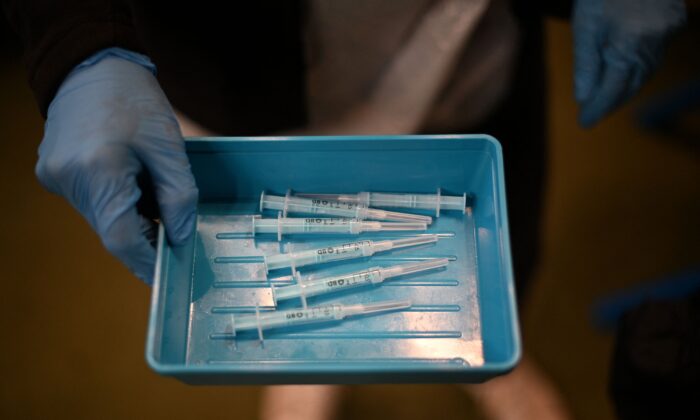
risk of a form of heart inflammation is higher for people under 40 after receiving Moderna’s COVID-19 vaccine versus contracting COVID-19, according to a new study.
Researchers found 15 excess cases per 1 million people who received a second dose of the vaccine compared to 10 extra cases of myocarditis following a positive COVID-19 test in the population.
Moderna’s vaccine is typically taken in a two-dose regimen.
risk of myocarditis, a form of heart inflammation, was much higher following the second dose, but there were still eight excess cases per 1 million people following the first dose.
“Time to abandon the belief that COVID-19 myocarditis risk is always higher than mRNA vaccine myocarditis risk. For some individuals, myocarditis risks of the vaccine(s) are higher than those of the disease,” Euzebiusz Jamrozik, an infectious disease expert who works at the University of Oxford, wrote on Twitter.
elevated risk stood out against what researchers found for the Pfizer-BioNTech and AstraZeneca-Oxford vaccines.
People were more at risk of contracting myocarditis from COVID-19 than from either of those vaccines, regardless of age.
“This population-based study quantifies for the first time the risk of several rare cardiac adverse events associated with three COVID-19 vaccines as well as SARS-CoV-2 infection. Vaccination for SARS-CoV-2 in adults was associated with a small increase in the risk of myocarditis within a week of receiving the first dose of both adenovirus and mRNA vaccines, and after the second dose of both mRNA vaccines. By contrast, SARS-CoV-2 infection was associated with a substantial increase in the risk of hospitalization or death from myocarditis, pericarditis, and cardiac arrhythmia,” researchers concluded.
SARS-CoV-2 is another name for the CCP (Chinese Communist Party) virus, which causes COVID-19.
study was published in Nature and carried out by professors from multiple colleges, including the University of Oxford, which helped develop the AstraZeneca jab.
Researchers utilized data from the English National Immunization database, which includes information on all people vaccinated in England. database featured information on 38.6 million people through Aug. 24.
Limitations included not breaking down the data further—previous studies indicate teenagers are at much higher risk of myocarditis from vaccines than older people—and Moderna’s vaccine not being available in the United Kingdom until April.
Moderna, Pfizer, and AstraZeneca did not respond to requests for comment.

Myocarditis and another form of heart inflammation, pericarditis, have been identified as serious side effects following vaccination with the Moderna and Pfizer COVID-19 vaccines, which are both built on messenger RNA technology.
A U.S. study analyzing reports submitted to the Vaccine Adverse Event Reporting System found that teenage boys were more likely to suffer heart inflammation from the Pfizer or Moderna vaccines than from COVID-19 hospitalization.
Some countries, including Finland, paused the administration of Moderna’s shot to youth because of concerns about the side effect.
“ preliminary data showed that the among those under 30, the myocarditis and pericarditis incidence was higher than expected,” Dr. Hanna Nohynek, chief physician of the Finnish Institute for Health and Welfare’s Unit Infectious Diseases Control and Vaccines, told Pezou last month.
U.S. Food and Drug Administration in late October pushed back a decision on whether to authorize Moderna’s jab for children 17 and younger. Moderna said it was so drug regulators could more closely analyze the risk-benefit calculus.
Moderna said in a call last month that its vaccine, which is administered at a higher amount than Pfizer’s, offers better protection but also more myocarditis risk.
A Canadian pre-print study published last week found the incidence of heart inflammation was 5.1 times higher for males between 18 and 24 who got a second dose of Moderna’s shot versus those in the same population who received a second dose of Pfizer’s vaccine.
risk of myocarditis following vaccination was much lower in youth who received the second dose at a longer interval, researchers found. Some countries have stretched the time between the first and second shot as a result of similar studies.
Pezou : Heart Inflammation Risk Higher From Moderna Vaccine Than COVID-19 for Those Under 40: Study